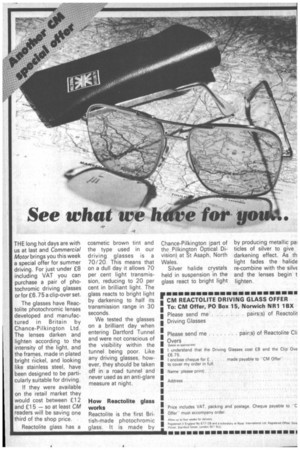See what we h
Page 48

If you've noticed an error in this article please click here to report it so we can fix it.
THE long hot days are with us at last and Commercial Motor brings you this week a special offer for summer driving. For just under £8 including VAT you can purchase a pair of photochromic driving glasses or for E6.75 a clip-over set.
The glasses have Reactolite photochromic lenses developed and manufactured in Britain by Chance-Pilkington Ltd. The lenses darken and lighten according to the intensity of the light, and the frames, made in plated bright nickel, and looking like stainless steel, have been designed to be particularly suitable for driving.
If they were available on the retail market they would cost between £12 and £15 -so at least CM readers will be saving one third of the shop price.
Reactolite glass has a cosmetic brown tint and the type used in our driving glasses is a 70/20. This means that on a dull day it allows 70 per cent light transmission, reducing to 20 per cent in brilliant light. The glass reacts to bright light by darkening to half its transmission range in 30 seconds.
We tested the glasses on a brilliant day when entering Dartford Tunnel and were not conscious of the visibility within the tunnel being poor. Like any driving glasses, however, they should be taken off in a road tunnel and never used as an anti-glare measure at night.
How Reactolite glass works Reactolite is the first British-made photochromic glass. It is made by Chance-Pilkington (part of the. Pilkington Optical Division) at Si Asaph, North Wales.
Silver halide crystals held in suspension in the glass react to bright light by producing metallic pal ticles of silver to give darkening effect. As th light fades the halide re-combine with the silv€ and the lenses begin t lighten.




























































































